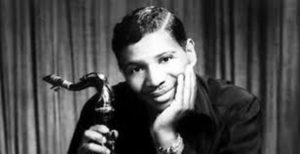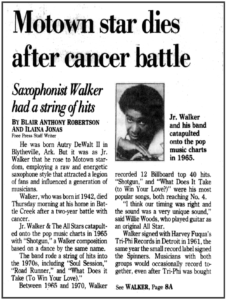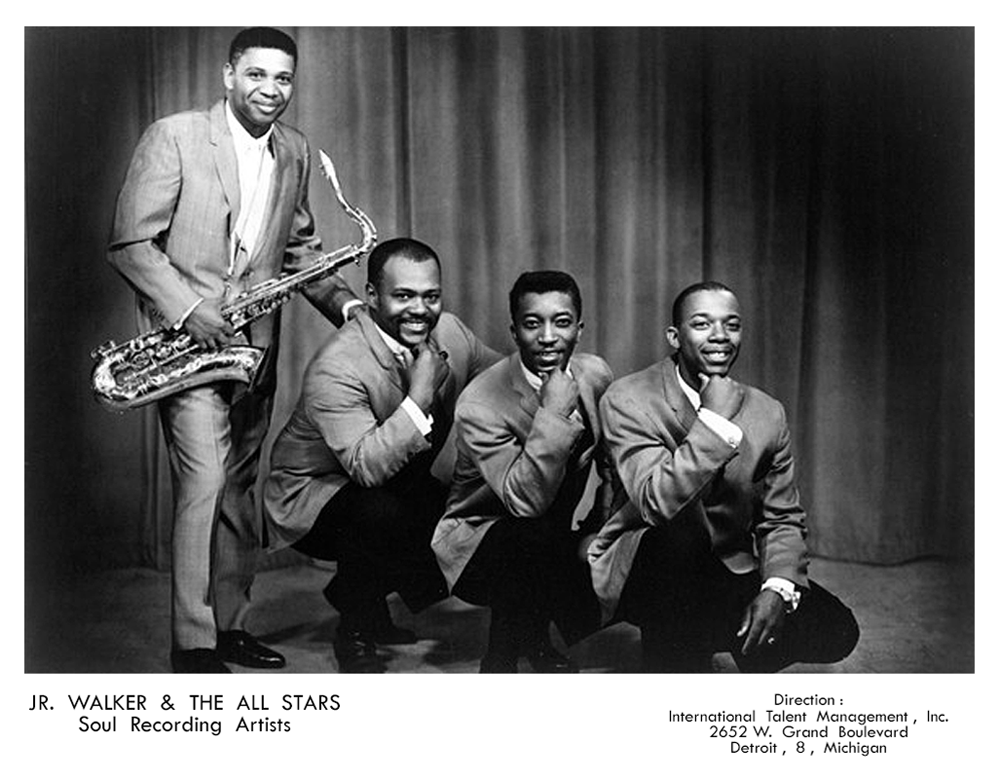—JR. WALKER & THE ALL STARS—
Autry DeWalt Mixon Jr. (June 14, 1931 – November 23, 1995), known professionally as Junior Walker, was an American multi-instrumentalist (primarily saxophonist and vocalist) who recorded for Motown during the 1960s.
 The group was spotted by Johnny Bristol, and he recommended them to Harvey Fuqua, in 1961, who had his own record labels. Once the group started recording on the Harvey label, their name was changed to Jr. Walker All Stars. The name was modified again when Fuqua’s labels were taken over by Motown’s Berry Gordy, and Jr. Walker & the All Stars became members of the Motown family, recording for their Soul imprint in 1964.
The group was spotted by Johnny Bristol, and he recommended them to Harvey Fuqua, in 1961, who had his own record labels. Once the group started recording on the Harvey label, their name was changed to Jr. Walker All Stars. The name was modified again when Fuqua’s labels were taken over by Motown’s Berry Gordy, and Jr. Walker & the All Stars became members of the Motown family, recording for their Soul imprint in 1964.
The members of the band changed after the acquisition of the Harvey label. Tony Washington, the drummer, quit the group, and James Graves joined. Their first and signature hit was “Shotgun”, written and composed by Walker and produced by Berry Gordy, which featured the Funk Brothers’ James Jamerson on bass and Benny Benjamin on drums. “Shotgun” reached No. 4 on the Billboard Hot 100 and No. 1 on the R&B chart in 1965, and was followed by many other hits, such as “(I’m a) Road Runner”, “Shake and Fingerpop” and remakes of two Motown songs “Come See About Me” and “How Sweet It Is (To Be Loved by You)”, that had previously been hits for the Supremes and Marvin Gaye respectively. In 1966, Graves left and was replaced by old cohort Billy “Stix” Nicks, and Walker’s hits continued apace with tunes such as “I’m a Road Runner” and “Pucker Up Buttercup”.

In 1969, the group had another hit enter the top 5, “What Does It Take (To Win Your Love)”. A Motown quality control meeting rejected this song for single release, but radio station DJs made the track popular, resulting in Motown releasing it as a single, whereupon it reached No. 4 on the Hot 100 and No. 1 on the R&B chart. From that time on, Walker sang more on the records than earlier in their career. He landed several more R&B Top Ten hits over the next few years, with the last coming in 1972. He toured the UK in 1970 with drummer Jerome Teasley (Wilson Pickett), guitarist Phil Wright (brother of Betty “Clean Up Woman”) Wright, keyboardist Sonny Holley (Temptations) and brilliant young Liverpool UK bassist Norm Bellis (Apple).The band played two venues on each of the 14 nights. The finale was at The Valbonne in London’s West End. They were joined on stage by the FOUR TOPS for an impromptu set.
In 1979, Walker went solo, disbanding the All Stars, and was signed to Norman Whitfield’s Whitfield Records label, but he was not as successful on his own as he had been with the All Stars in his Motown period.
Walker died of cancer at the age of 64, in Battle Creek, Michigan, on November 23, 1995.
___
(Source: Junior Walker; Wikipedia)
![]()


